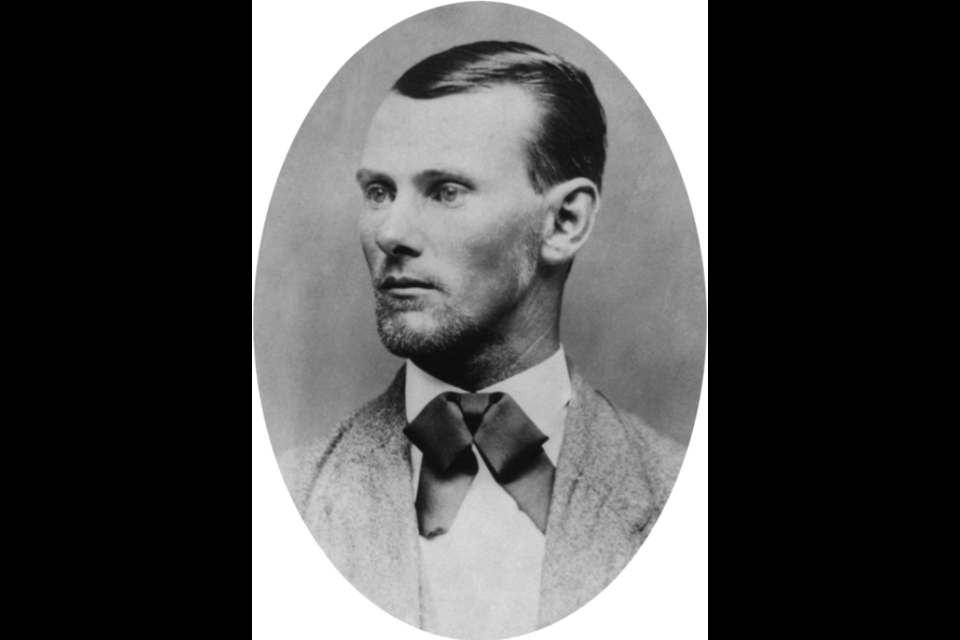Did Jesse James once ride the country roads of Wellington County?
I’m not talking about Jesse James the entrepreneur and television personality, but the legendary outlaw who helped make the old west wild, and who has been portrayed in the movies by such actors as Tyrone Power, Audie Murphy, Robert Duvall, Colin Farrell and Brad Pitt.
Between the end of the Civil War and his murder in 1882 at the hands of gang member Bob Ford, Jesse James was America’s most notorious bandit. In the company of his brother Frank, their pals the Younger brothers, and other assorted ne’er-do-wells, Jesse plundered banks, trains and stagecoaches, and on one occasion even robbed the box office of a county fair.
By the time of his death at age 34, he was the most wanted criminal in the country. In romantic tall tales and folk ballads, he became an outlaw hero; “America’s Robin Hood,” in the words of Teddy Roosevelt, although there is absolutely no evidence that Jesse ever shared any of his loot with the poor.
Due to the nature of their business, outlaws didn’t always let people know where they were going or where they’d been. There are periods in Jesse’s story – generally between hold-ups – in which his biographers and old west historians are uncertain of his movements. He and his contemporaries left little documentation for these gaps, and he could have been almost anywhere.
According to a Wellington County legend, on one occasion he was here.
The story says that Jesse James spent a winter in Ontario, dividing his time between Grey and Wellington counties. He allegedly was seen riding along the roads on a beautiful horse. He was said to have had hideouts in various locations, and one old bit of local lore says that for years people would point out bullet holes in the wall of an isolated log cabin where Jesse had allegedly done a little target practice with his six-shooters.
Some stories say Jesse did chores on a farm near Hopeville, and had meals with a neighbour named William Armstrong who was a farmer and a preacher. For those who might wonder how a bandit might get along with farmers and a man of the cloth, Jesse James did in fact come from a farming family, and in his home territory of Clay County, Missouri, was known to attend church regularly on Sundays, when he wasn’t away “on business.”
In one oft-repeated story, Jesse was riding that beautiful horse through Guelph Township when he came to a tollgate. He tossed a $20 gold piece to the gate-keeper, a young woman named Jane Lillie, because it was the smallest change he had. Jane eventually moved to West Garafraxa, and the story of the gold piece became part of local lore. The Jesse James stories were published from time to time in such newspapers as the Mount Forest Confederate and the Arthur Enterprise-News.
Apparently, after one winter in these parts, Jesse got “itchy feet” and decided to head back home. He was last seen riding toward Toronto. We can only wonder if the Canadian winter was a bit too chilly for a southerner like him.
Could any of the story be true? It certainly wasn’t unheard of for American desperadoes to cross the border into Canada to throw law enforcement officers off their trail. Frank Reno and his gang of train robbers hid out in Windsor until they were tracked down by Pinkerton detectives. They were arrested by Canadian police and extradited to the United States where they were subsequently lynched by a mob without benefit of trial.
Harry Longabaugh (aka The Sundance Kid), one of the most notorious members of Butch Cassidy’s Wild Bunch, was known to have roamed around what is now Alberta. The Newton Boys, a brotherhood of bank robbers from Texas, once pulled a heist in Toronto.
Jesse James isn’t even the only name from the dark side of history to have a local connection. There is a legend in Guelph that during the heady days of prohibition, when fortunes were being made off bootleg booze, the Royal City was an important link in the alcohol pipeline, and none other than Scarface Al Capone, the most infamous gangster of them all, was an occasional visitor. He allegedly stayed at the Albion Hotel.
So, while many will say that it’s unlikely Jesse James ever galloped his horse along the country roads of Wellington County or walked the muddy streets of downtown Guelph, it’s not beyond the realm of possibility. If Jesse really did come here, considering what eventually happened to him, perhaps he should have stayed.



